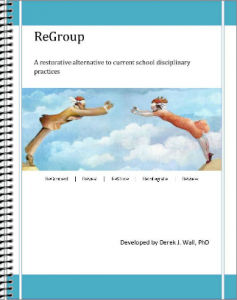 For many communities and families, schools are a safe haven for children. Schools create structure and support to encourage learning. Schools nourish. Schools protect. Over the past two decades, however, schools have been met with a unique challenge: How do we educate our children, keep them safe, without suffocating them with restraints? In the wake of Columbine and other school related tragedies, schools began adopting Zero Tolerance policies that provided clear rules as to a school’s response to student misbehavior. Twenty years later, Zero Tolerance has been a source of frustration and misguidance for many people, leaving school districts pursuing alternative forms of dealing with school discipline.
For many communities and families, schools are a safe haven for children. Schools create structure and support to encourage learning. Schools nourish. Schools protect. Over the past two decades, however, schools have been met with a unique challenge: How do we educate our children, keep them safe, without suffocating them with restraints? In the wake of Columbine and other school related tragedies, schools began adopting Zero Tolerance policies that provided clear rules as to a school’s response to student misbehavior. Twenty years later, Zero Tolerance has been a source of frustration and misguidance for many people, leaving school districts pursuing alternative forms of dealing with school discipline.
Restorative Discipline in Schools Consultation and Facilitation
At Restorative Psychological Services, Inc., we provide consultative and training services to school districts seeking an alternative to Zero Tolerance policies. While Zero Tolerance policies seek to separate, suspend, and expel when misbehavior happens, restorative approaches seek to unite, include, and reintegrate. Utilizing existing research and proven tools, school districts are empowered to build a restorative approach to discipline and to heal the harm caused by misbehavior in schools as opposed to simply upholding the rules.
Restorative Discipline in Schools gives students the opportunity to learn behaviors that builds trust with their school community.
ReGroup
In response to growing exclusionary discipline practices for classroom/school infractions, Dr. Wall has developed a program titled ReGroup that aims to provide solutions that are more inclusive in nature and is designed to create opportunities to teach students the impact choices have upon the school community and those within it (themselves included).
When students face suspension, school districts are tasked with finding answers to many challenging questions:
- How to move from handing down a punitive punishment to a student for a behavior that violates policy, that may include suspension, and reintegrate them back into the school community with minimal disruption?
- How do we create a system where the suspended student feels as if they were actually challenged to think about what they did, how it impacted others, and how they can attempt to make it right for those negatively impacted?
- How do we create a system in which the school community can welcome students returning from a suspension with an opportunity to recognize the effort of the suspended student to make things ‘as right as possible’?
Wouldn’t it be ideal to know that when a student returns from a suspension, that they are coming back more aware of the impact their choices have had on others and have been given the opportunity to identify ways that they can ‘make it right’, in accordance with what those impacted by their behavior have communicated as necessary to accomplish?
The ReGroup program is designed to be a service available to students facing:
- A long term suspension (45 days or more) who may wish to remove and/or reduce a suspension due to non-violent misbehavior in school – students referred to the program must be willing to be held accountable for their participation in the misbehavior as well as willing to commit to 1 hour per week for 6 weeks. Additionally the student must be able to identify a parent, legal guardian, and/or stakeholder who will be willing to participate with the student in the 6-week ReGroup program
- A short term suspension (1-44 days) who may wish to remove and/or reduce a suspension due to non-violent misbehavior in school – students referred to the program must be willing to be held accountable for their participation in the misbehavior as well as willing to commit to ReGroup meetings (location and term of ReGroup to be determined by length of suspension and district administration discretion)
- At risk for suspension or other disciplinary action due to persistent disruptive behaviors
who may wish to avoid intervention and are willing to be held accountable for misbehavior as well as willing to participate in ReGroup meetings during the school day and actively engage the process of identifying poor choices and how those choices are impacting those around them.
Additionally, the principles of ReGroup are useful in guiding schools through the management of day to day disciplinary issues that may not result in suspension and/or expulsion. Through the use of ReGroup practices, teachers, administrators, and parents are given the opportunity to recognize and repair harm to relationships, thereby preventing the need for exclusionary disciplinary practices. For more information on how your school can develop both proactive and responsive ReGroup strategies to meet the needs of your community, please contact Dr. Wall.
ReGroup has options for customization in an effort to meet the diverse needs of each school district.
These programs are restorative in nature and process, and seek to accomplish the following objectives:
- Create a sense of community within the group participants
- Create opportunity for students to witness their misbehavior from multiple community vantage points
- Teach/develop student capacity to express emotion/affect in a healthy and constructive manner
- Empower students to be a part of the rebuilding of broken relationships due to misbehavior
- Empower students to actively engage in the construction of a plan to re-integrate back into the school community
- Empower community stakeholders to be active in the student’s attempts to repair harm with those impacted by misbehavior.
- Prevent re-occurrence of harm within and outside of school community relationships.